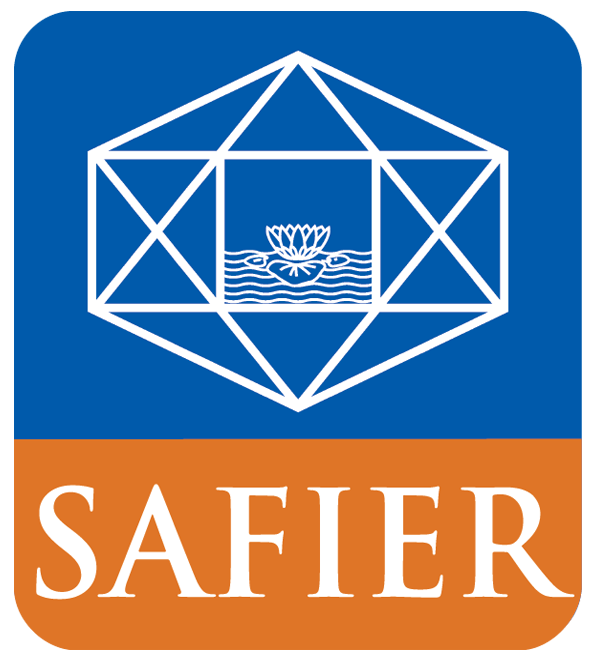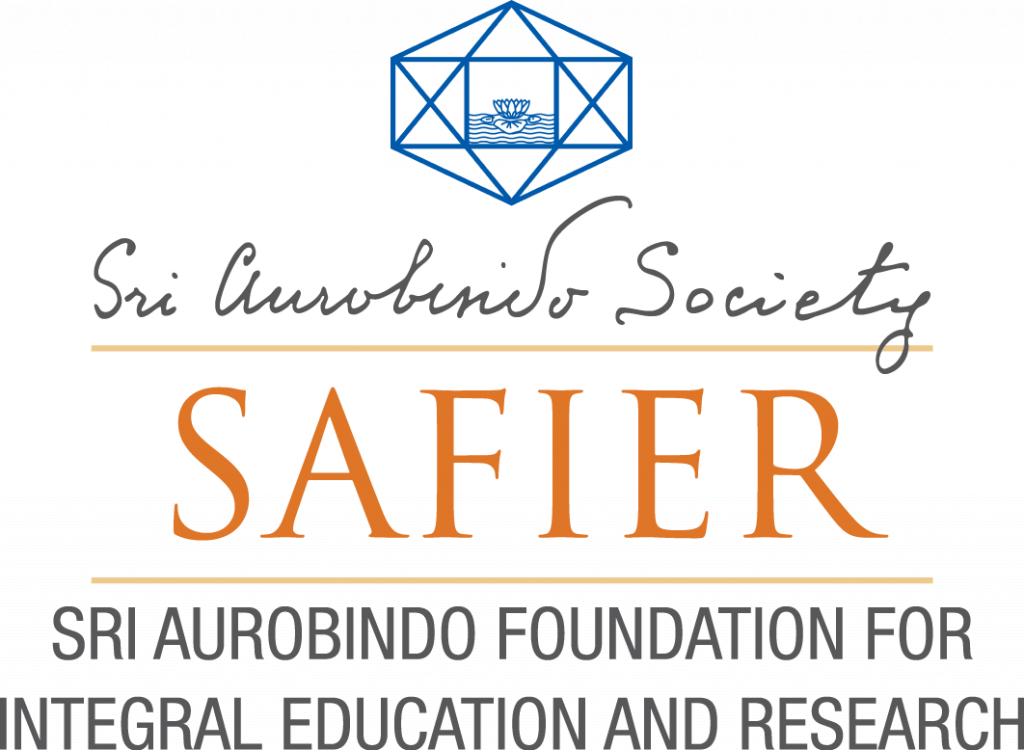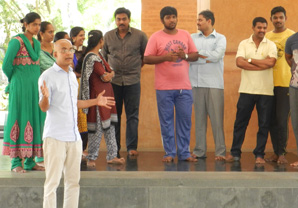Date: Jul 3–7, 2017
Location: DSE Complex, Society Hall and SAS Sharanam Amphitheatre, Puducherry
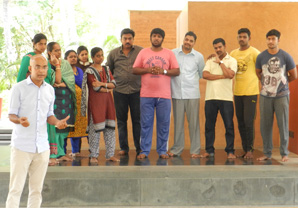 A five-day ‘Theatre Arts in Integral Education (TAIIE) Camp’ was held from July 3 to 7, 2017, for Master Resource Persons of the Ministry of Education, Puducherry. Twenty participants underwent a transcendental journey via this camp on Theatre Arts’ integrated approach to Integral Education. The camp was held at three venues in Puducherry, namely, Directorate of School Education (DSE) Complex, Society Hall and SAS Sharanam Amphitheatre.
A five-day ‘Theatre Arts in Integral Education (TAIIE) Camp’ was held from July 3 to 7, 2017, for Master Resource Persons of the Ministry of Education, Puducherry. Twenty participants underwent a transcendental journey via this camp on Theatre Arts’ integrated approach to Integral Education. The camp was held at three venues in Puducherry, namely, Directorate of School Education (DSE) Complex, Society Hall and SAS Sharanam Amphitheatre.
Ravi Shanker (Creative Director, TAIIE) and Kiran – both practitioners in the field of Integral Education at Sri Aurobindo Society – facilitated the sessions at the camp.
Day 01 (July 3)
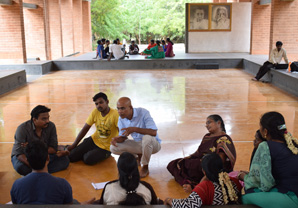 Theme of the Day: Introduction to Theatre Arts in Integral Education
Theme of the Day: Introduction to Theatre Arts in Integral Education
The camp’s inauguration ceremony set the tone of intensive learning in the realm of Theatre Arts and Integral Education. Following introductions, a relaxed environment was created which was comforting enough for all to go deeper into their selves. In a reflective inward journey, all the participants launched into a discovery of who they really were – beyond names, educational qualifications, likes and preferences. It was Theatre Arts via which everyone expanded their understanding of who they really were. A virtual journey was embarked upon into the process of theatre with an imaginary game – a step-by-step process of developing a chosen theme into a full-fledged theatre performance. This process did not only show the elements of theatre arts but also the role it can play in creating an experiential learning and teaching environment. Using body, mind and emotions, everyone plunged into a theatre-integrated game of widening that birthed hidden potentials of an unexplored actor. Every move of the game pushed the attending participants to a step higher on the rung of awareness; enabling all to take charge of actions consciously.
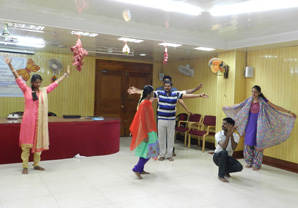 The participants remarked during the reflection-session that both the processes helped them realize that the more they become aware of their thoughts, emotions and body, the more they discover that their ‘accepted-limitations’ begin to dissolve. They also expressed enhanced trust in their selves as they recognized that they could now engage in things they had earlier believed were impossible for them to take up.
The participants remarked during the reflection-session that both the processes helped them realize that the more they become aware of their thoughts, emotions and body, the more they discover that their ‘accepted-limitations’ begin to dissolve. They also expressed enhanced trust in their selves as they recognized that they could now engage in things they had earlier believed were impossible for them to take up.
Day 02 (July 4)
Theme of the Day: Education
The background music set the mood for further exploration. The participants concentrated on their breath and observed passing thoughts without entertaining them. With the reverberation of calmness felt afterwards, they 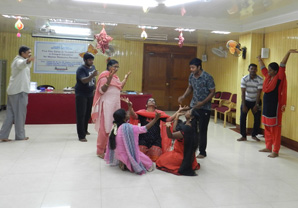 enquired into the main theme of the camp – ‘Education’. Deeper investigation into what one had known education to be revealed what it is not and also its possibilities. As the groups came together to share and examine their recent discoveries of education, each group’s understanding of education expanded. Finally each groups’ expanded understandings were again shared, examined, improvised and synthesized to identify a collective insight on education.
enquired into the main theme of the camp – ‘Education’. Deeper investigation into what one had known education to be revealed what it is not and also its possibilities. As the groups came together to share and examine their recent discoveries of education, each group’s understanding of education expanded. Finally each groups’ expanded understandings were again shared, examined, improvised and synthesized to identify a collective insight on education.
Day 03 (July 5)
Theme of the Day: Creating Learning Environment
The third day’s atmosphere was quieter and serene. It started with a guided concentration process that helped to bring the focus to the agenda for which all had gathered. As the topic of “learning – environment” was touched upon via freewheeling interaction, the participants discovered that the pressure of completing the syllabus within stipulated deadlines has always been an impediment to the learning and teaching process. Further questioning also revealed that what is being taught according to the syllabus is ineffective because most often it is not grasped by the students. It then dawned that teachers too need to go deeper into the topics, in their entirety, which they taught. There was also a need to create a conducive learning environment in schools, explore creative ways of teaching and co-learn along with students despite all the pressures.
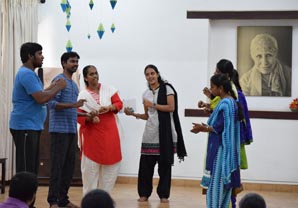 Recognizing this need to play the roles as co-learners, the participants began to invent ways of creating a learning environment in schools that is conducive, experiential and enjoyable. Using Theatre Arts, they weaved emotions and improvisations to host a skit that communicated implementable creative approaches of renovating our schools which would be in harmony with the central purpose of education. This process involved everyone’s mind, body, energy and trust in the self to be able to utilize their full potential. Various plausible and progressive approaches were identified that could be implemented in schools in order to make learning and teaching an experiential, engrossing and enjoyable process.
Recognizing this need to play the roles as co-learners, the participants began to invent ways of creating a learning environment in schools that is conducive, experiential and enjoyable. Using Theatre Arts, they weaved emotions and improvisations to host a skit that communicated implementable creative approaches of renovating our schools which would be in harmony with the central purpose of education. This process involved everyone’s mind, body, energy and trust in the self to be able to utilize their full potential. Various plausible and progressive approaches were identified that could be implemented in schools in order to make learning and teaching an experiential, engrossing and enjoyable process.
Day 04 (July 6)
Theme of the Day: Instant Theatre & Joy of Learning
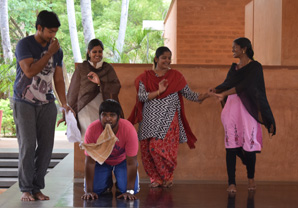 The day started amidst the beauty of Sharanam, one of Asia’s few green amphitheatres that stands as a paradigm of ‘sustainability’ and ‘progress in harmony with our natural surroundings’. Following a brief introduction to Sharanam, the session began by reflecting upon the learning shared by all. All the participating education enthusiasts expressed a compelling willingness to learn more and explore further the elements of Theatre Arts as a tool for learning and teaching. Every theme suggested was found to be connected to each other akin to various branches of a tree that appeared to be rooted in the soil of love and nurture. Through improvisation two plays were performed that sensitized the audience towards their surroundings and listen to their inner guide to be able to adequately respond and address the phase of callousness and avarice that humans are passing through. This process of instant-theatre not only increased their compassion but also made them more widened and courageous.
The day started amidst the beauty of Sharanam, one of Asia’s few green amphitheatres that stands as a paradigm of ‘sustainability’ and ‘progress in harmony with our natural surroundings’. Following a brief introduction to Sharanam, the session began by reflecting upon the learning shared by all. All the participating education enthusiasts expressed a compelling willingness to learn more and explore further the elements of Theatre Arts as a tool for learning and teaching. Every theme suggested was found to be connected to each other akin to various branches of a tree that appeared to be rooted in the soil of love and nurture. Through improvisation two plays were performed that sensitized the audience towards their surroundings and listen to their inner guide to be able to adequately respond and address the phase of callousness and avarice that humans are passing through. This process of instant-theatre not only increased their compassion but also made them more widened and courageous.
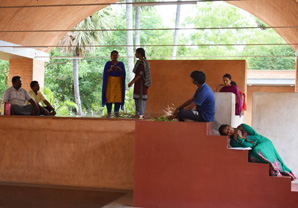 The second half of the day began with seeing the world through children’s eyes. A play on the arrived theme “Joy of Learning” was prepared by two groups with different plot-points and delivery. Both the performances reaffirmed and strengthened the realizations that joy of learning is one of the innate gifts humankind is blessed with. Amongst many other observations, the teachers remarked that the whole process was a real eye-opener for them!
The second half of the day began with seeing the world through children’s eyes. A play on the arrived theme “Joy of Learning” was prepared by two groups with different plot-points and delivery. Both the performances reaffirmed and strengthened the realizations that joy of learning is one of the innate gifts humankind is blessed with. Amongst many other observations, the teachers remarked that the whole process was a real eye-opener for them!
Day 05 (July 7)
Theme of the Day: Project-based Integral Learning & Teaching through Theatre Arts
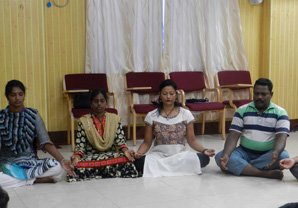 On the last day of this camp, the session started with an extensive concentration process. Following this experience, there were discussions on the possibilities of exploring a Theatre Arts-integrated project connecting all the subjects in relationship to the self in order to learn and teach. Each group then picked up a lesson from their curriculum and enquired into the possibilities of discovering what and how other subjects, humans, other creatures and objects are connected to the chosen lesson. Their findings became their raw material for weaving and devising a play using all the processes of Theatre Arts that they experienced during this camp. Upon reflection, there was realization how insightful, engrossing and enjoyable this process of learning and teaching was.
On the last day of this camp, the session started with an extensive concentration process. Following this experience, there were discussions on the possibilities of exploring a Theatre Arts-integrated project connecting all the subjects in relationship to the self in order to learn and teach. Each group then picked up a lesson from their curriculum and enquired into the possibilities of discovering what and how other subjects, humans, other creatures and objects are connected to the chosen lesson. Their findings became their raw material for weaving and devising a play using all the processes of Theatre Arts that they experienced during this camp. Upon reflection, there was realization how insightful, engrossing and enjoyable this process of learning and teaching was.
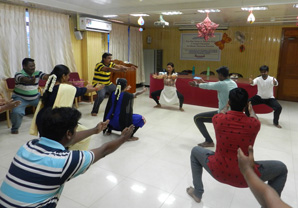 Following an hour’s assimilation, a few games on dynamic concentration were played. Thus energised, all sat for an extensive reflection; first via visualization and then by putting them into words. Each participant also chalked out an action plan.
Following an hour’s assimilation, a few games on dynamic concentration were played. Thus energised, all sat for an extensive reflection; first via visualization and then by putting them into words. Each participant also chalked out an action plan.
Finally after the valedictory address, all the participants dispersed in gratitude with immense joy, enthusiasm and love.
Feedback
I was totally blank about what ‘theatre arts in integral education’ was before attending this camp . . . the way we virtually lived together for 15 days, creating a play on ‘love’ just by using our imagination was awesome! . . . The games helped all of us to come out of our shells and feel free to express our attitudes through our postures . . . It also brought out leadership qualities in us and brought out the real ‘me’ in times of stress and pressure and how important it was to ‘keep our cool’ even in the most stressful situations. . . .
Discussions on education by teachers had been a long-pending and necessary act. This session gave me an opportunity to discuss education and made me think about what education meant to me as an individual, as a teacher. I introspected on how I feel about education and what all I need to expect out of education. When I started hearing words, I started connecting my views and others’ views on education and finally came up with a 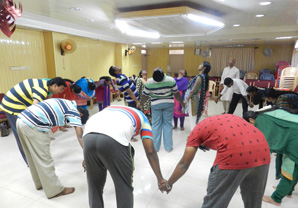 definition on education like great thinkers like Montessori did. But it made me think whether this definition was defining the truth of education that I have been imparting to my kids and the shameful answer was ‘NO’. . . I thought I should give each child in my class their own space and time . . . I learnt the art of teamwork and how important it was to listen to people before judging them or before responding . . . This camp made me introspect on my habits, my thinking, my teaching, my planning and my behaviour too . . . Thank you so much for helping me find myself and move one step ahead towards reaching my goal and enjoying the path while doing it. . . . This camp was not a usual one, no boredom; it was a camp for ‘self-realisation’.
definition on education like great thinkers like Montessori did. But it made me think whether this definition was defining the truth of education that I have been imparting to my kids and the shameful answer was ‘NO’. . . I thought I should give each child in my class their own space and time . . . I learnt the art of teamwork and how important it was to listen to people before judging them or before responding . . . This camp made me introspect on my habits, my thinking, my teaching, my planning and my behaviour too . . . Thank you so much for helping me find myself and move one step ahead towards reaching my goal and enjoying the path while doing it. . . . This camp was not a usual one, no boredom; it was a camp for ‘self-realisation’.
– N. Srilakshmi, Primary School Teacher (PST), Embalam
He (camp facilitator) never defined education yet he made us realize the real meaning and importance of education. Through our words he made us explore the value of education.. . . We had ended up creating a fake environment which we thought would please our superiors. Now I hope everyone who attended this training will definitely give more importance to “what pupil wants to learn” than “what teachers want to teach” on the given day . . . I have decided to build a conducive environment in my classroom where there will be more freedom less rules, more do’s than don’ts, more harmony than chaos, more peace than discipline and more what my students want to learn than what I want to teach . . . I have decided to let children learn at their own pace. No dragging them to match the speed of others. Also I have decided to protect the curiosity of every child and not to snub them when they ask questions.. . .
– B. Suresh, PST, GHSS Koodapakkam
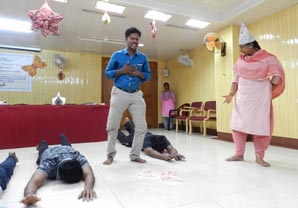 This camp helped me to bring out the child from within. I don’t feel that I am a teacher. Rather it feels as if I have become a child.. . . This training has given me an immense strength to reform the field of education.. . . All my shyness has gone; I have gained confidence.
This camp helped me to bring out the child from within. I don’t feel that I am a teacher. Rather it feels as if I have become a child.. . . This training has given me an immense strength to reform the field of education.. . . All my shyness has gone; I have gained confidence.
– V. Bharathi Roja, PST, GPS, Karikalampakkam
The activities presented were done unknowingly. We experienced the concept of “learning without knowing” with every moment of the activity.
– Gayathri Kannan, PST, GGPS, Bahour
I enjoyed the whole session like a kid. I could understand that everything had vast meanings. I am on the way to finding and understanding them.
– Santosh Karthik, PST, GHSS Koodapakkam
